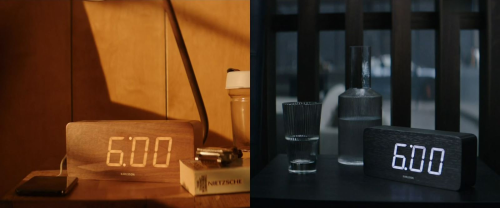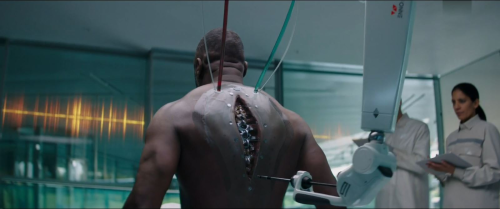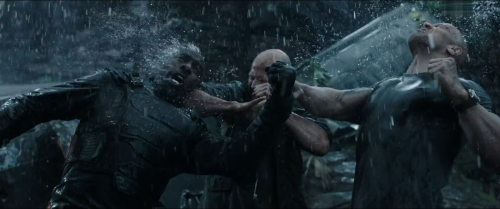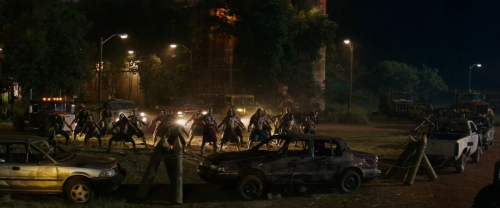In the movie Fast and Furious Presents: Hobbs and Shaw, we see the message of Nietzsche.
Let’s start with the fact that both main characters were once antagonists in the Fast and Furious series, both to the heroes of the Fast and Furious series, and to each other (once Hobbs joins the crew). They are men of action. The starting montage, where both of them get ready for their day, in parallel but in aesthetically different ways, hints at how the Good in a sense of the word good are kind of the same wherever they are. If you recall, Good in the Nietzschean sense means to be competent, to be effective, to be free in following your will, and kind of just doing what you want. In modern times, you might call this the Chad stereotype, someone who’s relatively free of self hate. Not necessarily free of self-reflection, but definitely free of the strong self-judgment that Nietzsche equates with what the new good is. When he’s talking about slave morality, he means a morality in which bad has become good. Because the old good, the good of competence and nobility, the good that is relatively free of self judgment was in his history, at some point, overtaken by the bad. The old bad just meant you weren’t good. It didn’t mean you were evil, or anything like that. Just that you weren’t on top. This is kind of evident in the word villain. It comes from that social space between peasant and slave. Someone who works the land for someone else. It’s associated with being like a village person who doesn’t have manners. But at some point, this bad got together in a sort of priesthood, and changed what it meant to be good. So that the new good was to be against evil. To be against dominance, and if you weren’t against something, then you were not good.
By Nietzsche’s reckoning, this is the paradigm we currently mostly live in. And because the old good kind of just goes about their day, there’s no sense of urgency compared to the new good, where we have to fight against this intolerance, we have to fight against these heathens, we have to fight against whatever is coming at you, whatever will attack you if you don’t fight.

Hobbs and Shaw are, in some ways, examples of the old good. They don’t exactly suffer from self-judgment. They’re kind of just going about their day, doing whatever they feel like doing. Whatever makes them feel good. And we see a nod to Nietzsche, early on. When the character Hobbs (played by Dwayne “The Rock” Johnson) says, “Your body has more wisdom in it than all your wisest philosophies” or something like that. Also in the beginning of the movie, you can see a book by Nietzsche sitting by his bed.
The villain, the antagonist of Hobbs and Shaw, is a corporation driven by transhumanist and utilitarian ideals. Their chief enforcer is a cyborg taken from near death, and brought back to life as a killing machine. We find out later that he used to be an associate of Shaw’s. And growing resentful and greedy, he turned on his teammates. Etion, the organization in question, wants to control the direction of the world in order to save it from itself. To provide control and security for the entire world, they want to unleash a virus that will kill off part of the world’s population in order to manage that population. This is a familiar theme, I think, we’re seeing in the last 10 years. The first major antagonist (Thanos) for the Marvel Cinematic Universe had a similar motivation.

The dependence on technology allows the antagonists to avoid making the strong social ties that our protagonists, Hobbs and Shaw, are forced to make with each other. Because keep in mind, they used to be enemies. And these guys, at least on the surface, don’t seem to like each other at first. But remember that they’re Good characters in a Nietzschean old, noble, Good way of being good, which means that they don’t really hate each other. And when they realize that this other enemy is getting in both their ways, it’s very easy for them to start working together.
Now, Etion, which is implied to be partially run by some sort of AI, or at least with the assistance of a lot of machine learning and so on, cannot comprehend people who will not be bought, because it sees the world as things to organize, reduce, and move around, to put into categories and so forth and to make things legible or clearly seen. To make things transparent to a large, sprawling bureaucracy. It cannot comprehend that these two men who were only recently working against each other could form a bond strong enough to take them on. Moreover, with the help of overwhelming technology, Brixton’s (the enforcer cyborg played by Idris Elba) character can’t comprehend how these two men who are not similarly modified, who have not given their soul (so to speak) away to this technology can ever hope to face him. He, you know, is near bulletproof. He’s got a lot of robot parts. He’s stronger than them, he should win. And the mercenaries employed by Etion are similarly decked out with, you know, fully Wi-Fi compatible weapons, which are assigned to the user so that they are not supposed to work for anyone else, and so on and so forth. But of course, this is a weakness as well as a strength.
When Hobbs and Shaw are left with nowhere to go, Etion has essentially turned the entire world against them by basically manipulating media sources into saying that they’re both terrorists. When this happens to Hobbs and Shaw, they have nowhere to turn to but family. All the while, Shaw’s sister (she’s the third main character) is also heavily involved in this. She’s what drags them into this in the first place. So on both ends, this is big on using your familial networks, your kinship ties, as well as your fictive kinship ties, as in the tie between Hobbs and Shaw, to overcome a superior force.
Now, Hobbs has been at odds with his family, because his family was a criminal family, and he turned into a lawman. But in this movie, it’s clear that the lines are not really between the good guys and the evil guys, in terms of the law, but in terms of who your family is, and who doesn’t have family. None of the people at Etion seem to- I mean, they believe in what they believe in, but they don’t believe in each other as much as our protagonists believe in each other. So Hobbs, even though he’s been estranged from his criminal family past, makes amends with them. They don’t have a lot of technology. But they improvise a lot of weapons. And they have the support of the entire local community in this Samoan island that Hobbs is from. And because Etion uses extremely fancy weapons, this is actually a way for the protagonists to disable those weapons for a little while. Because the more complex your technology is, the easier it is to throw a wrench into it.
This is a pattern that you can see with Vietnam, among many other places. Like when the North Vietnamese used Chinese wheelbarrows and bicycles to transport artillery through difficult terrain, the Americans really could never have expected that. Or at least, most of their senior bureaucrats, most of the senior officers never could imagine anyone doing that, because that’s not what they would think to do. They would think to use their technology, their Jeeps, their helicopters, and so on. So the fact that the local Vietnamese decided to take these artillery pieces apart, and put them on bicycles, and kind of walk them through the woods was something they could not have predicted. This kind of thing happens again and again, you can see it in Syria, with people making mortars at home, you can see it in Afghanistan with donkey-based IEDs. You can see it in Iraq with communication networks that use children- this happens just about anywhere that isn’t post-industrial, really. Boys are often used as a more reliable communication than your average satcom network. But also you can see it in the coordination of the tiffin wallahs in Indian cities, large groups of completely uneducated people, organizing deliveries that are more effective and also extensively more complicated than anything Uber Eats, or those other apps can manage in the United States. And Hobbs makes a point, somewhere in the movie, that people actually like him because he likes people. And this is a really important point.
These tiffin wallahs, the street hawkers in Indonesia, in Malaysia, the boys, I’m sure in Iraq, the groups of Vietnamese in the Vietnam War, and Afghanistan and so on. Like all these groups, all these peoples- they liked each other. Now, sure, there might be inter-factional disagreements, and a lot of fear going on as well with some of these groups, such as the Taliban and so on, but between each other- between their main networks, they like each other. And that is more than a sprawling, high tech organization can often understand because if you can’t measure it, it does not exist. And it’s very hard for these organizations to measure likes, as much as they surely try with like buttons.

In the final battle, Hobbs and Shaw beat the antagonists by working directly together. And by taking hits for each other, through using the sort of sacrifice that an old economic model of human behavior, for instance, would not account for. And it shows the Nietzschean message of love for the earth. Love for people. Love for humanity. This love is what will let people go beyond being human in the old way, which is to rely on masks, to rely on models of what a person is, of what a polite, or a good, or a law abiding person is, to look beyond that, at the humans in front of you. To look beyond that, at the entire organism- the organism in front of you. And to appreciate that this view produces strength in the end, even if it may initially look like weakness, because it’s always more reliable. It’s always more solid, to be for something than against something. Because the moment you’re against something specifically, the moment you’re against life, because you think it’s too weak or too imperfect, is the moment you are dependent on something else in order to live.
This dependence ultimately breeds a strong resentment. So that when push comes to shove, when you are sufficiently stressed out, you will lose. Because you’re already used to attacking yourself, because you already resent yourself, for denying yourself at all. Because at the end of the day in this fight, Hobbs and Shaw love themselves and Brixton and the organization Etion do not. They are fundamentally disgusted by humanity, which is why it wants to change it almost completely. And this is a trap. Many transhumanists fall into thinking that to go beyond human, you have to hate humanity. You have to dislike the parts of you that are human. When really, to go beyond human, you have to accept everything about humanity, to be truly transhuman, to be truly beyond human to be truly post human. You must accept and celebrate everything that is human so that you can build on that, to go on to the brave, uncertain future
that will come of accepting what is already there.
This attitude, I think, is best shown when Hobbs says, “The Island will provide, brother” when Shaw wonders what they’re going to do without weapons. When you embrace humanity, when you embrace our communities, when you embrace the people right in front of you, as opposed to the ideals you might prefer– solutions to many problems simply appear because they were not being considered before in the lens of the old value system.

If you’re Etion looking at these guys, because you value technology, and something more reliable than humans, you don’t see the social capital you’re sitting on that can be weaponized. You think people are replaceable, that discovery can be reduced. You don’t see all the impromptu weapons that can be made. Because you have a category in your head of what a weapon is and what a good weapon is and what it is not. And because of that you will only see your own manufactured weapons as weapons. But as in the case of Hobbs and Shaw, if you accept what is there, then you love it and because you love it, you’ll turn anything into a weapon. And you’ll know that what wins battles, what wins wars, what wins conflicts is not any technology by itself. It’s not a tool, by itself. It is the minds that use the tools. It is the battle of wills between each faction. Even if we switch to completely drone based warfare tomorrow, it’s going to be humans at the end of the day that are using those drones. And even if an AI is born- a strong AI- a fully intelligent, independent creature. Even if that is born, it will be the will of that AI versus the will of other agents.